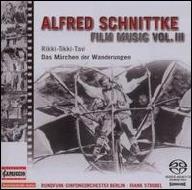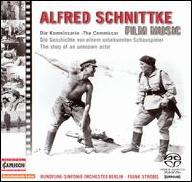The multiplicity of Schnittke's music was partly a result of his biography. He was raised Jewish but converted later in life to a mystical strain of Christianity. Of Russian, German, and Jewish background, he moved between Russian and German cultural spheres over his entire career. Schnittke was born in the Russian city of Engels on November 24, 1934. His father was a Jewish journalist and translator, and his mother was of German-Russian background. In the wake of World War II, Schnittke's father was sent to Vienna, and the young Schnittke soaked up the musical atmosphere there and began to dream of a career as a composer. The family moved to Moscow in 1948, and Schnittke enrolled at the Moscow Conservatory in 1953, remaining there through 1961 and earning a master's degree. He composed a symphony in 1956 but later numbered it as Symphony No. 0. He taught at the Moscow Conservatory from 1962 to 1972 and also earned money as a film composer; he penned some 70 film scores over 30 years. For much of his career, Schnittke divided his time between Moscow and Hamburg.
Schnittke's mature compositions began to appear in the 1960s, a period during which his style was influenced at first by that of Dmitri Shostakovich and then by serialist Luigi Nono. Among his first pieces to make an impact were the String Quartet No. 1 and Violin Concerto No. 2 (both 1966) and a pair of violin sonatas (1964 and 1968). Later in the decade, he became interested in Western avant-garde and aleatoric styles, quickly becoming a hero to other experimentally minded young Soviet composers. His Symphony No. 1 of 1972, mixing Soviet socialist realism with a host of other styles, was a breakthrough work; he feared that it might be repressed by the Soviet state's cultural apparatus, but the atmosphere was liberalizing, and it was accepted. Other widely performed Schnittke works of the 1970s were a Piano Quintet (1976) and the Concerto Grosso No. 1 (1977). Befriending such major Soviet performers as violinist Gidon Kremer, violist Yuri Bashmet, and cellist Mstislav Rostropovich, Schnittke penned for them four violin concertos, a viola concerto, and two cello concertos, as well as a concerto for choir. Schnittke composed eight symphonies, with an almost completed ninth orchestrated and arranged after his death by conductor Gennady Rozhdestvensky. Schnittke's works embody a great variety of genres and forces; in 1980, he wrote a Minnesang for 52 voices.
In 1985, Schnittke suffered a stroke and was declared clinically dead but recovered and continued to compose prolifically. The music from the last part of Schnittke's life has a dark, often spiritual flavor sometimes influenced by his adopted Christian faith. Schnittke moved to Hamburg for good in 1990. Several of his symphonies date from the 1990s. Schnittke died on August 3, 1998, in Hamburg. He is buried at Moscow's Novodevichy Cemetery, the resting place of Shostakovich and other noted Russian composers.
Recordings of Schnittke's music have steadily become more common, and he has been championed by both Russian and Western performers. His Symphony No. 1 was recorded for the BIS label by the Royal Stockholm Philharmonic under conductor Leif Segerstam. Several volumes of Schnittke's film music have been recorded by the Rundfunk-Sinfonieorchester Berlin. By 2020, some 140 of Schnittke's works had been recorded. ~ James Manheim, Rovi
|
1
|
|
Katz-und-Maus-Spiel |
|
2
|
|
Epilog |
|
3
|
|
Pest |














